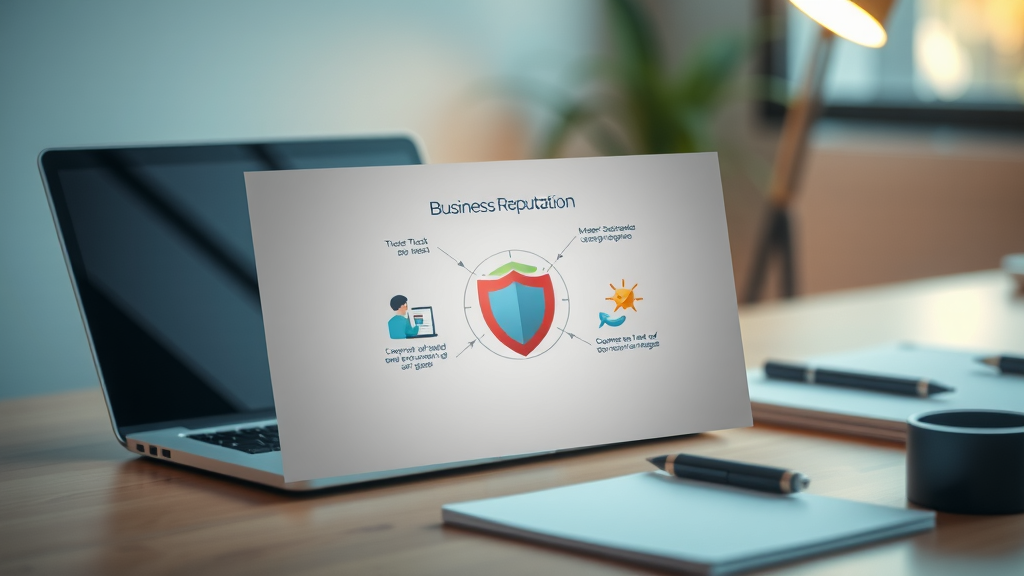In our hyper-connected digital landscape, a strong business reputation can be the key to thriving or merely surviving. “Building Trust: How to Enhance Your Business Reputation in a Digital World” dives into the crucial elements that shape how customers perceive your brand. By mastering the art of reputation management, you’re not just safeguarding your image; you’re unlocking new opportunities for growth and customer loyalty. Join us as we explore actionable strategies to enhance your business’s credibility and foster lasting relationships in an ever-evolving online marketplace.
What is Business Reputation?
Defining Business Reputation
Business reputation refers to the perception that customers, employees, and the general public have about a company. It encompasses various factors, including the quality of products or services, customer service, ethical practices, and the overall experience customers have with a brand. A good reputation is a valuable asset that can drive customer loyalty and influence purchasing decisions.
Importance of Business Reputation
Having a positive business reputation can have significant implications for a company’s success. Some key points include:
Increased Trust: Customers are more likely to purchase from brands they trust.
Competitive Advantage: A strong reputation can differentiate a brand from its competitors.
Higher Revenue: Brands with good reputations often enjoy higher sales and can charge premium prices.
Key Elements of Business Reputation
Several critical elements contribute to building and maintaining a strong business reputation. Here’s a breakdown:
Element |
Description |
|---|---|
Trustworthiness |
Customers need to feel confident in your brand. |
Quality Products |
Offering high-quality products or services enhances reputation. |
Customer Service |
Prompt and effective customer service fosters loyalty. |
Transparency |
Open and honest communication builds trust. |
Social Proof |
Positive reviews and testimonials can influence potential customers. |

The Role of Online Reputation in Business
How Online Reviews Impact Business Reputation
Online reviews play a pivotal role in shaping a business reputation. They provide potential customers with insights into the experiences of others. The impact of reviews can be categorized into:
Positive vs. Negative Reviews
Positive Reviews: Enhance credibility and attract top talent.
Negative Reviews: Can significantly damage a brand’s reputation, leading to a loss of revenue.
To illustrate, consider the following statistics:
Review Type |
Impact on Purchasing Decision |
|---|---|
Positive |
79% of consumers trust online reviews as much as personal recommendations. |
Negative |
72% of consumers will avoid a business with negative reviews. |

The Influence of Social Media on Business Reputation
Social media platforms have transformed how businesses interact with customers. A strong social media presence can enhance business reputation by fostering engagement and real-time feedback.
Customer Engagement: Brands can communicate directly with customers.
Brand Loyalty: Positive interactions can lead to increased customer loyalty.
Crisis Management: Quick responses to negative feedback can mitigate damage.

Building and Maintaining a Good Business Reputation
Strategies for Enhancing Business Reputation
Building a positive business reputation involves strategic planning and execution. Here are effective strategies:
Engaging with Customers: Foster relationships through personalized communication.
Managing Customer Feedback: Regularly solicit and respond to customer feedback to improve services.
The Importance of Customer Service: Exceptional service is crucial for maintaining a good reputation.

The Impact of Brand Image on Business Reputation
Brand image directly influences business reputation. Companies with a strong brand image often enjoy greater consumer trust and loyalty. Here’s how to strengthen brand image:
Consistent Messaging: Ensure all communications reflect your brand’s values.
High-Quality Content: Share valuable content that resonates with your target audience.
Visual Identity: Develop a strong visual identity that aligns with your brand’s mission.

Reputation Management: Tools and Techniques
Online Reputation Management Software
To effectively manage a business reputation, utilizing online reputation management (ORM) software is essential. These tools help businesses monitor their online presence and respond to feedback effectively.
Choosing the Right Reputation Management Company
Selecting a reputable reputation management company can significantly impact your business reputation. Look for:
Proven track record
Transparent pricing
Comprehensive services

Monitoring Your Business Reputation
Regularly monitoring your business reputation is crucial. Consider these approaches:
Set Up Google Alerts: Receive notifications for mentions of your brand.
Use Social Listening Tools: Track conversations around your brand on social platforms.
Review Sites Monitoring: Keep an eye on reviews on platforms like Yelp and Trustpilot.
The Consequences of a Poor Business Reputation
Financial Implications of Reputation Damage
A damaged business reputation can have dire financial consequences. Companies may experience:
Loss of Revenue: Negative perceptions can deter potential customers.
Increased Marketing Costs: Rebuilding a reputation often requires costly marketing efforts.
Loss of Revenue and Customer Trust
Research indicates that businesses with poor reputations can lose significant market value, impacting long-term sustainability.
“The bottom line is that reputation matters. Companies must prioritize their online image to avoid severe financial repercussions.”

The Bottom Line: Why Reputation Matters
Ultimately, a strong business reputation is a vital component of sustainable success. Brands that invest in reputation management often enjoy:
Attracting Top Talent: Candidates prefer companies with a good reputation.
Customer Loyalty: Satisfied customers return, driving repeat business.
Case Studies: Successful Reputation Management
Real-World Examples of Reputation Recovery
Several companies have successfully navigated reputation crises. One notable case involves Rosa Chun, who implemented effective strategies to restore brand image.
Case Study by Rosa Chun
Crisis Management: Addressed negative press quickly and transparently.
Customer Engagement: Initiated a customer feedback program to regain trust.

Key Takeaways for Managing Business Reputation
Summary of Key Strategies
To sum up, effective reputation management encompasses:
Engaging with customers regularly.
Monitoring online reviews actively.
Building a strong brand image that resonates with customers.
Best Practices for Building a Positive Reputation
Prioritize customer service: Treat customers with respect and attentiveness.
Leverage social proof: Encourage satisfied customers to leave positive reviews.
Stay transparent: Openly communicate any challenges or changes to your audience.
Final Thoughts on Business Reputation
The importance of maintaining a strong business reputation cannot be overstated. It is a journey that requires continuous effort and adaptation.

Frequently Asked Questions
Q: How do online reviews affect my business reputation?
A: Online reviews significantly impact consumer trust. Positive reviews can enhance your reputation, while negative ones can deter potential customers.
Q: What are the best tools for managing business reputation?
A: Popular tools include reputation management software like BrandYourself and ReviewTrackers, which help monitor online feedback and analytics.
Q: How can I improve my business reputation quickly?
A: Engage with your audience on social media, respond to reviews, and offer exceptional customer service to enhance your reputation rapidly.
Conclusion
In conclusion, managing your business reputation is essential in today’s digital landscape. By focusing on building trust, engaging with customers, and leveraging technology, businesses can create a positive image that fosters customer loyalty and long-term success.
Key Takeaways:
A strong business reputation drives customer loyalty and increases revenue.
Online reviews and social media significantly influence business reputation.
Continuous monitoring and engagement are vital for reputation management.
By implementing these strategies, you can protect and enhance your business reputation, ensuring your brand thrives in an ever-competitive marketplace.
Additional Resources
For further insights, check out this YouTube video on business reputation management strategies.
 Add Row
Add Row  Add
Add 




Write A Comment